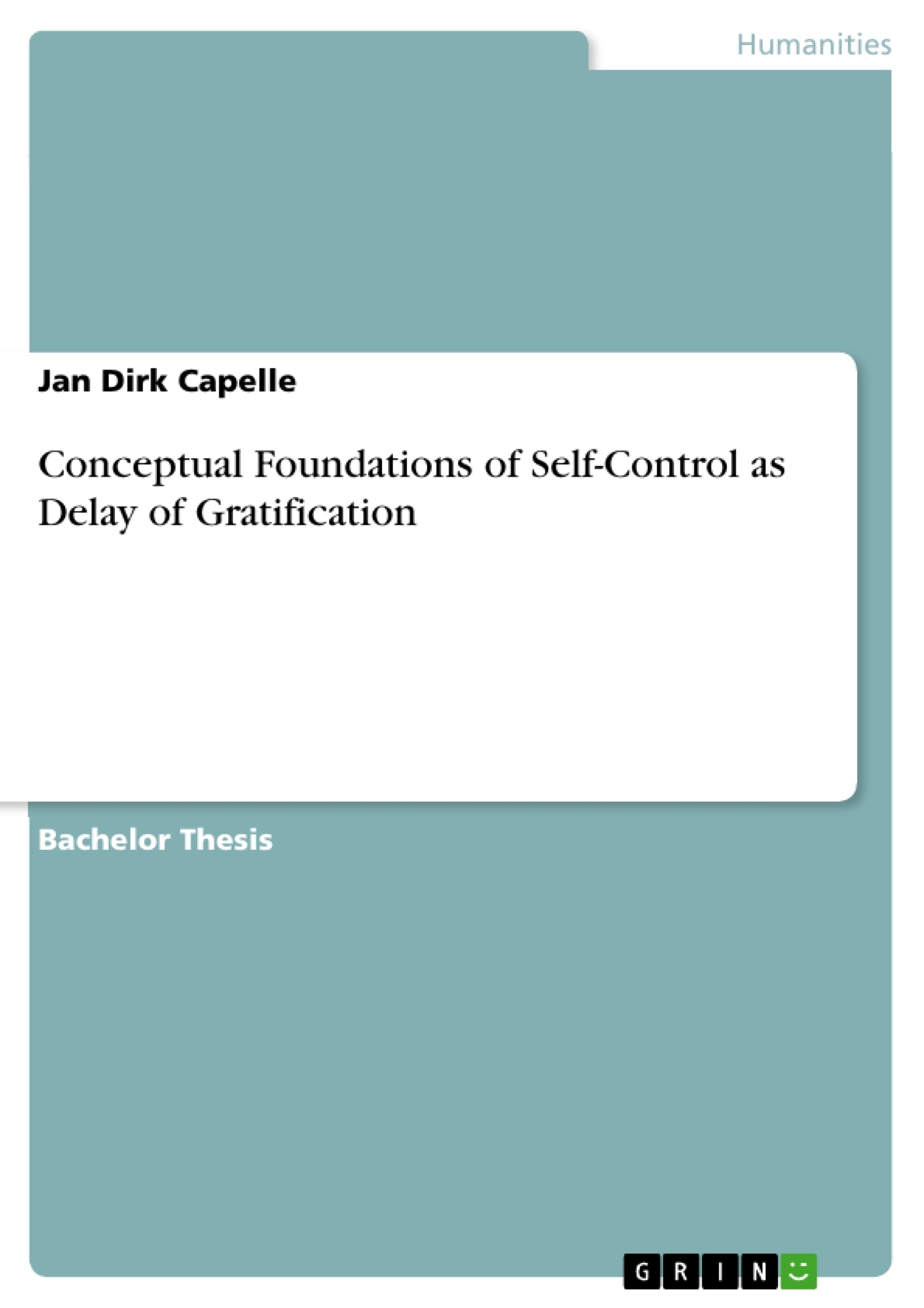Did you have a New Year's resolution? What was it - loosing weight? Being more friendly to a colleague? Quitting to smoke? Maybe stopping to procrastinate the tasks at hand? And if that was the case: How successful have you been in prevailing your resolutions? Whatever it was, chances are good that by now you have had a relapse. But why is that so - that we are apparently not able to stick to (at least some of) our good intentions1? Obviously, this thesis will not be able to answer this question thoroughly. However, it does intend to provide a basis for a better understanding of this question. In folk psychology, the challenge of resisting a certain class of desires and the corresponding behaviors (like smoking) is often referred to with expressions like resisting temptations, exercising willpower, or self-discipline. And as it is often the case with terms or phrases that are widely used in everyday life, there is a variety of dierent concepts that underlie the same term, thus making it hard to eciently communicate about it. In example, while Peter might loud himself of his extraordinary self-control, for he considers it a heroic act of willpower to stay up an entire weekend to nish an essay that is due the next week, his friend might reproach him and argue that it has been his very lack of self-control that has brought him in the situation of having to pull "an all-nighter". Who is right then and why?
"Nicht erst seit Walter Mischels bekannten Experimenten zum Belohnungsaufschub
stehen die Konzepte Selbstbeherrschung, Selbstkontrolle und Willensstärke im
Fokus sowohl der psychologischen als auch der philosophischen Forschung. Doch
handelt es sich hier bei genauerem Hinsehen um ein ganzes Konvolut von Begriffen und familienähnlichen Konzepten, die bei verschiedenen Autoren in verschiedenen Forschungskulturen je unterschiedlich ausgelegt und verwendet werden. In dieser Situation ist es daher mehr als nützdienlich, ein wenig „begriffliche Aufräumarbeit“ zu leisten – und genau diesem Ziel widmet sich die vorliegende Bachelorarbeit von Jan Dirk Capelle in vorbildlicher Weise." (Kommentar Erstbetreuer)
Inhaltsverzeichnis (Table of Contents)
- Introduction
- Preliminary Definitions and Assumptions
- A More General Limitation: Self-Control vs. Self-Regulation
- Narrowing down the Definition of Self-Control
- Further Definitions and Assumptions
- What this Thesis is not about
- Aims and Course of Action
- Aims
- Course of Action
- Challenges
- Methodology: It's all about Distinctions
- Relevance of Self-Control
- Self-Control as Delay of Gratification
- Setting the Stage - Initial Conditions
- Short-Term Value Attribution as a Normative Problem
- The Relation of Intentions and Behavioral Decisions
- "Genuine" Delay of Gratification and the "Surrender Scenario"
- Potential Moderating Variables
- Provisional Summary
- Putting it all together: An Analytical Framework
- Summary and Future Perspectives
- Summary: What Has Been Reached
- Perspectives: What May Follow Next
Zielsetzung und Themenschwerpunkte (Objectives and Key Themes)
This thesis aims to contribute to a better understanding of self-control, particularly in the context of delaying gratification. It aims to clarify the different notions surrounding self-control by analyzing the underlying conditions for attributing self-control failure. Furthermore, it seeks to establish an analytical framework for comparing different self-control scenarios.
- Clarifying the concept of self-control and its relationship to self-regulation.
- Examining the relationship between intentions and behavioral decisions in the context of self-control.
- Analyzing the role of short-term value attribution in the experience of self-control failure.
- Developing an analytical framework for comparing different self-control scenarios.
- Exploring the relevance of self-control in various contexts.
Zusammenfassung der Kapitel (Chapter Summaries)
The introduction lays the groundwork by defining key terms and outlining the thesis' objectives. It emphasizes the need for clarification in the conceptualization of self-control due to the diverse interpretations found in scientific literature. The thesis focuses on self-control failure, particularly within the framework of resisting short-term gratification in favor of longer-term goals.
Chapter 2 delves deeper into self-control as delay of gratification. It explores the initial conditions and the normative problem associated with short-term value attribution. The chapter also examines the relationship between intentions and behavioral decisions, and it introduces the concept of "genuine" delay of gratification and the "surrender scenario." Potential moderating variables are discussed, leading to a provisional summary of the key arguments.
Chapter 3 presents an analytical framework that aims to provide a comprehensive understanding of different self-control scenarios. It synthesizes the insights from the previous chapters to create a framework for analyzing and comparing various theoretical perspectives, experimental findings, and everyday situations.
Schlüsselwörter (Keywords)
This thesis focuses on the concepts of self-control, self-regulation, delay of gratification, intention-behavior gap, short-term value attribution, and analytical framework. It explores these concepts in the context of understanding self-control failures and provides a comprehensive approach to analyzing different self-control scenarios.
Frequently Asked Questions
What is the difference between self-control and self-regulation?
The thesis explores these definitions, often viewing self-control as a specific subset of self-regulation focused on resisting immediate temptations.
What does "delay of gratification" mean?
It refers to the ability to resist an immediate reward in hopes of obtaining a more valuable or significant reward in the future.
Why do people fail to stick to their New Year's resolutions?
The work analyzes the "intention-behavior gap" and how short-term value attribution often outweighs long-term goals in the moment of decision.
What is the "surrender scenario" in self-control research?
It describes a situation where an individual consciously gives in to a temptation despite having a prior intention to resist it.
What is the aim of the analytical framework provided in the thesis?
It aims to synthesize theoretical perspectives and experimental findings to better compare and understand different scenarios of self-control failure.
- Citation du texte
- Jan Dirk Capelle (Auteur), 2013, Conceptual Foundations of Self-Control as Delay of Gratification, Munich, GRIN Verlag, https://www.grin.com/document/265778



